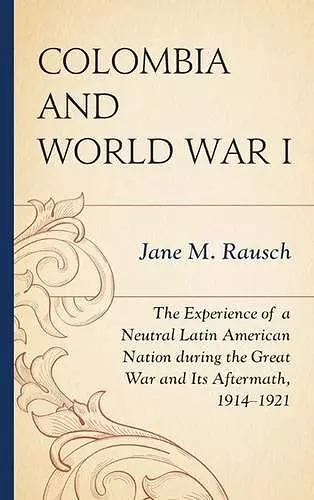Colombia and World War I
The Experience of a Neutral Latin American Nation during the Great War and Its Aftermath, 1914–1921
Format:Hardback
Publisher:Lexington Books
Published:12th Jun '14
Currently unavailable, and unfortunately no date known when it will be back

In the horrific conflict of 1914–1918 known first as “The Great War” and later as World War I, Latin American nations were peripheral players. Only after the U.S. entered the fighting in 1917 did eight of the twenty republics declare war. Five others broke diplomatic relations with Germany, while seven maintained strict neutrality. These diplomatic stances, even those of the two actual belligerents—Brazil and Cuba—did little to tip the balance of victory in favor of the allies, and perhaps that explains why historians have paid scant attention to events in Latin America related to the war. Nevertheless, it is still remarkable that Percy Alvin Martin’s classic account, Latin American and the War, first published in 1925, remains the standard text on the topic. This book attempts to redress this gap by taking a fresh look at developments between 1914 and 1921 in one of the neutral nations—Colombia. This period, which coincides with the presidency of José Vicente Concha (1914–1918) and his successor, Marco Fidel Suárez (1918–1921), is filled with momentous developments not only in foreign policy, when Colombian diplomats pressured by German, British and U.S. propaganda struggled to maintain strict neutrality, but also on the domestic scene as the newly installed Conservative regime faced political and economic crises that sparked numerous and violent protests. Rausch's examination of the administrations of Concha and Suárez supports Martin’s assertion that even those countries neutral in the Great War were not immune from its effects.
Jane Rausch's study of Colombia, a somewhat precariously neutral Latin American country, is an important contribution to [the study of World War I] . . . Rausch is an acknowledged authority on Colombia and the frontier regions of the capitalist era around Latin America. . . .This study shows in new detail the Colombian elite's perspective on the process by which the United States took the opportunity of wartime conditions across the Atlantic. . . .Rausch's account is fluently written, and it includes several apt cartoons from the war years. It adds an important national dimension to the growing literature on Latin America in those years in the setting of global events. * Hispanic American Historical Review *
Jane Rausch has been systematically studying the history of Colombia for fifty years. In this remarkable new book, the author juxtaposes Colombian neutrality during the 'Great War' (1914) with a dramatic domestic/international polemic: ratification of the Thomson-Urrutia Treaty (1921) in the United States. For Rausch, ratification represented a steady but uneven movement into twentieth-century modernity for the South American nation. -- Michael J. LaRosa, Rhodes College
Professor Rausch's important new volume explores the myriad economic, political, and diplomatic effects of World War I on Colombia, one of seven Latin American nations that maintained strict neutrality while the Great War raged in Europe. A period long neglected by historians, Rausch hopes that her book will encourage comparative scholarly research on other Latin American nations during the same time frame (1914–21). Her findings illuminate both the stark and subtle challenges Colombians faced during a period of great global and hemispheric change. -- Michael Edward Stanfield, University of San Francisco
Once it was thought that Colombia had passed World War I by. Now Jane Rausch has shown that the European conflict had a daily impact on Colombia, thrusting its civilian and elected leaders into agonizing balancing acts, between falling European markets, fiscal crises, a growing relationship with the United States, which many could not quite trust, foreign investors, and political protests, all embittering their political disputes. Yet, the story told here is the resilience of Colombia’s institutions and leaders during those difficult years. -- Herbert Tico Braun, University of Virginia
ISBN: 9780739187739
Dimensions: 235mm x 159mm x 17mm
Weight: 363g
152 pages